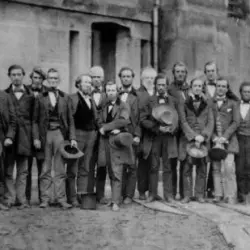I listened carefully and responded, "It sounds like a frog." He smiled again, paused for a few seconds, looked expectantly at me, and announced, "You will not hear this species of frog anywhere else on the temple grounds." "Why?" I asked. "Because this species of frog only stays near water that is as you described: clear, calm, and refreshing." He looked intently at me to see if I fully understood what he was really telling me. Then we walked on.
Since this was a Shinto shrine, brimming with a sense of animism, I knew we had not been speaking about water and frogs but about something larger, deeper. He had called upon me to appreciate the crucial impact of being near and within a place that is calm, clear, and refreshing: silence and solitude. Otherwise, how could I hear and understandmyself—both my journey and the cul-de-sacs I might get lost in on the way?
Early in life during my summer wanderings through the fields, town, and forest, I learned that everyone needs some quiet time alone either outside or at home. Most of us rarely experience it. But it is essential—even for those of us with a pronounced extroverted side.
A winter storm may be nature's way of encouraging this. The roads are unplowed, schedules are canceled, and some unexpected free time appears without any prior planning. On one occasion such a storm resulted in my canceling a long-awaited and much-anticipated visit to speak in Budapest. I was elated. My soul was so tired that knowing that I would have a full week to meditate, reflect, relax, read, and do some writing was like receiving a great gift.
Maybe the time to slow down and be quiet comes in a different way to you. For instance, maybe you get a "touch of the flu" and decide to stay in bed to sleep lightly, do some reading, watch an old movie, or jot down notes in the journal you irregularly keep but like to have as a tool to remember the turns in your journey. Whatever happens during these occasions, though, all of us need some silence and time alone. We need to recognize the rhythms in our day, week, and year that make this possible and take advantage of them wherever we can.
On the farm in the late spring and summer, time to slow down comes at the end of a long day before falling asleep. There are longer periods too when winter shuts down the haying, the summer help and boarders are gone, and people go to bed early after taking care of the animals. The middle of the day is quiet, except for slowly attending to those little construction projects that couldn't be done in the heat and activity of summer, such as repairing the pig pen or doing a proper cleaning out of the outer buildings. But whether we live in the country, in the city, or near the city—like I do now on a small section of what was an old farm—the possibilities for living fully come to light when we take steps to be mindful in silence and solitude.
For Robert Lax, poet and best friend of Thomas Merton, living out a country psychology actually involved a move from New York City to the Greek Isles where he lived the last thirty years of his life. In his diary, reflecting on his move from New York City and his recent move from one Greek Isle to another one that he found more conducive to his work as a writer and his life, he wrote:
Night seems lighter, less heavy here . . . the weight of people stirring around at night, the weight of their thoughts, the weight of their plans seem to create a physical pressure in the air about all the cities: creates, that is, a psychological pressure so strong that it seems tangible, physical, bears down like a weight on the shoulders.
It would be hard to imagine a similar weight bearing down on so small an island. Being gathered even from the nocturnal fantasies . . . of so small a community. . . .
For perhaps the same reason, an incident taking place (and I still mean at night) in the city has not the same weight as one that takes place in a smaller town; an anecdote told at night in the city doesn't resonate quite like the same anecdote told in an island village. There are paradoxes to be discerned here, because although life in a city seems to be constantly changing, each violent occurrence within it, each brutal fact seems to be permanent, seems to become part of its unchanging face; in an island village the opposite is true: the hills about it are permanent. The seasons come and go in a stable rhythm; houses are built to stand till they fall; children carry the names of their forebears, and, within this mostly cosmic framework, incidents in the life of man seem smaller, more ephemeral: parts, rather, of a cosmic pattern than isolated omens of good or ill.
As a result, a country man takes news philosophically, whereas a city man is likely to hear it with panic.
Yet, as I noted, for those of us who live near or in the city, absorbing a country psychology usually doesn't mean going off to a lightly populated, out-of-the-way place—although, it is fi ne to do this if you can and wish to do so. Instead, with a slightly different focus, it means appreciating where we already live but in a richer way. With a sense of the simple themes such as those lightly touched upon in this book, an attitude can change and with it a perspective.




